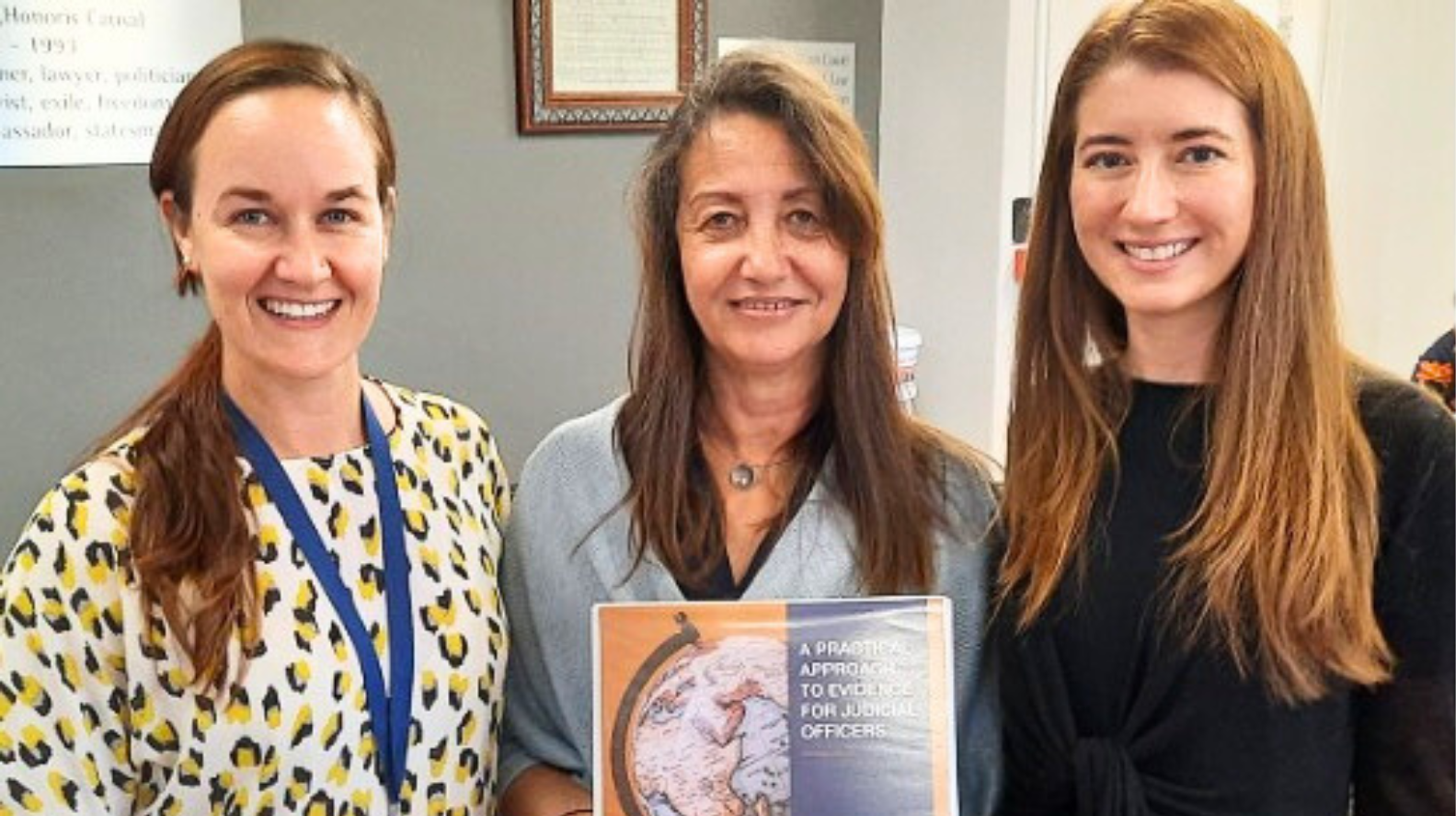This website uses cookies
We use cookies to ensure that we give you the best experience on our website. If you continue to use this site we will assume that you are happy with it.

In 2023, the Judicial Institute for Africa (JIFA) at the University of Cape Town Faculty of Law, in partnership with the Legal Information Institute’s Women & Justice Collection (WJC) at Cornell Law School, published A Practical Approach to Evidence for Judicial Officers: Common Law Sources and African Applications. In January, WJC Advocacy & Research Director Jocelyn Hackett joined JIFA in celebrating the official launch of the manual with South Africa’s U.S. Consul General Todd P. Haskell representing USAID, which has been a key supporter of the groundbreaking resources created by JIFA and its partners the Democratic Governance & Rights Unit (DGRU) and the African Legal Information Institute.
Led by Justice Mathilda Twomey, JIFA’s academic director and the first woman Seychellois judge and chief justice of the Supreme Court of Seychelles, the evidence manual is a critical tool for common-law African judiciaries forging independent legal systems in the wake of centuries of colonization. Dr. Twomey and her co-editors, Joelle Barnes, Jocelyn Hackett, and Michelle Ebrahim, created a practical resource to assist judges in jurisdictions with mixed legal traditions.
The manual explains the common-law origins of evidence law, then offers contemporary country-specific analyses of thirteen southern and eastern African countries with a shared common-law colonial history: Botswana, Eswatini, Kenya, Lesotho, Malawi, Mauritius, Namibia, Seychelles, South Africa, Tanzania, Uganda, Zambia, and Zimbabwe.
From June 2021 to September 2022, Jocelyn Hackett, who is also an adjunct professor, led a team of eighteen Cornell Law students who prepared the foundation for twelve of the thirteen country-specific guides. The WJC team’s in-depth examination of these issues was made possible by the free legal resources created and compiled by the African Legal Information Institute, directed by Mariya Badeva-Bright, and its national LII partners across Africa as well as the support and vision of Cornell Law School’s Legal Information Institute. Founded in 1992 by Cornell Law School Dean Peter Martin and Director Thomas Bruce, LII’s leadership in the global free access to law movement is now headed by co-directors Sara Frug and Craig Newton.
WJC’s contribution to this manual is part of a years-long partnership with the University of Cape Town’s DGRU. Directed by Vanja Karth, the DGRU is home to JIFA and African LII. Over the years, this partnership has provided numerous opportunities for WJC’s Cornell Law student teams to examine pressing legal challenges related to the rule of law and human rights in Africa and around the world. As part of this partnership, Cornell Law students annually conduct research in South Africa alongside experts from Judges Matter, a DGRU program dedicated to South Africa’s constitutional mandate to transform the judiciary and legal system after apartheid. As UCT Law Dean, Professor Danwood Chirwa, noted in his address, the DGRU’s active commitment to involving law students, the next generation of rule of law advocates, “in all its cutting-edge work” is a cornerstone of their transformative approach to the rule of law.
At the January event, the African LII launched other innovative legal resources in addition to the evidence manual. PocketLaw, which allows users to access all of African LII’s caselaw, legislation, and other legal resources for free without an internet connection, is a game-changing resource for consistent access to law for overburdened judges, court employees, attorneys, and legal researchers. Similarly, their new index of legal materials on sexual and gender-based violence from fifteen African jurisdictions will help ensure fair treatment and consideration of these critical issues.
The launch event was a joyous and somber occasion. While the University of Cape Town was delighted to celebrate these innovative resources and welcome the inaugural class of its Post Graduate Diploma in Judicial Studies, which provides specialist education in adjudication in constitutional democracies for judges and judicial-track attorneys, the DGRU and African human rights community were also mourning the sudden, tragic loss of one of their own. Prominent Swazi human rights lawyer Thulani Maseko was assassinated in his home in Eswatini just two days before the event. DGRU Director Vanja Karth called on the Southern African Development Community and African Union to conduct an independent investigation into his murder. Maseko’s fearless advocacy for democratic rule of law will continue to inspire his colleagues and future generations of advocates to continue his work.
The members of the student writing and editing team are:
María Barraza, LL.M. ’21
Salma Bencherif, LL.M. ’21
Kyle Burrus ’23
Anushna Das, LL.M. ’21
Sofia Ferrara, LL.M. ’21
Driston Galvao ’23
Laurence Greenberg ’24
Claire Kamau ’24
Ziwei Lin, LL.M. ’21
Zhongyu Liu, LL.M. ’21
Diarmuid O’Leary, LL.M. ’22
Ratu Kica Pertiwi, LL.M. ’21
Nicolle Robles, LL.M. ’21
Zoe-Pascale de Saxe Roux, J.D./LL.M. ’24
Irene Xu ’22
Yanbin Xu, LL.M. ’21
Siobhan Zeiler, LL.M. ’21
Yichao Zhang ’22
Full details of the student contributions can be found on page 34 of the manual.